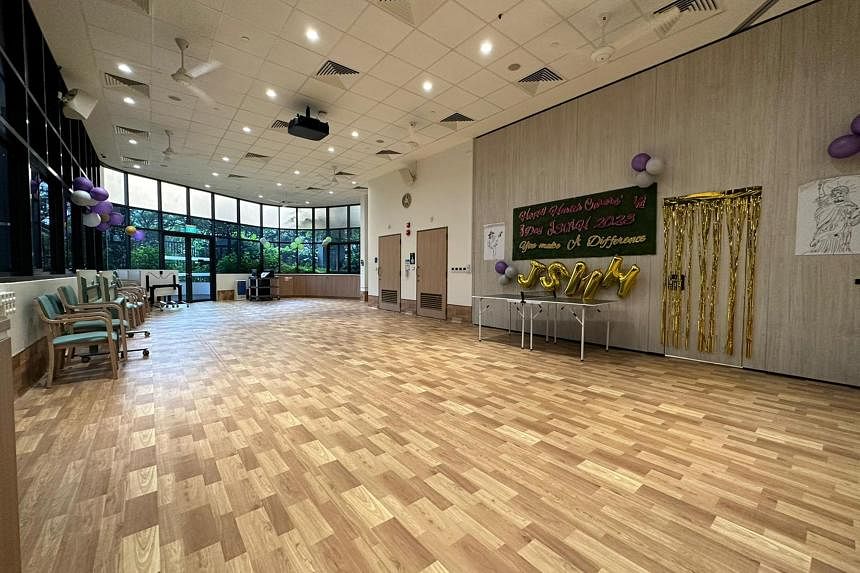SINGAPORE – Special polling stations set up in nursing homes will make it easier and more convenient for less mobile seniors to vote, and give those who are bed-bound a chance to exercise their democratic right this presidential election, said nursing home operators.
Thirty-one nursing homes islandwide are involved in a pilot where polling arrangements will be set up on-site, with mobile polling teams going bedside to residents who are bedridden. They will be able to cast their vote from 8am to 8pm on Polling Day next Friday.
Each of the 31 nursing homes selected for the pilot has more than 50 voters. According to the Ministry of Health’s website, there are 83 nursing homes in Singapore as at 2022.
NTUC Health cluster director of residential services for the west area Chong Wai Fung said most nursing home residents are wheelchair- or bed-bound, and arranging transport to the general polling station in the community can be a challenge.
“For the general election in 2020, residents who had their polling station located near to the nursing homes were wheeled to the polling station in small groups. For some residents who had polling stations located far from the nursing home – for example, from Geylang to Bukit Batok – special transport had to be arranged to send residents to the polling site,” she added.
Staff on leave or off duty were activated to help. Many of them, including the homes’ drivers, worked extended hours to enable all residents who were eligible voters to cast their votes, said Ms Chong.
This time round, all of NTUC Health’s six nursing homes, with a total of more than 1,600 residents, are involved in the pilot, making things much easier operationally.
An approximate average of 55 per cent of its nursing home residents for each home are eligible to vote in the 2023 Presidential Election.
The polling stations will be located at multi-purpose halls of the six nursing homes, and the sites were chosen because they had enough space and were accessible.
“A polling station within the nursing homes allows residents to be wheeled to the polling station in a much shorter time,” Ms Chong said.
Nursing home operators say they do not expect many logistical challenges in carrying out the new polling arrangements.
Sree Narayana Mission (Singapore) (SNM) chief executive S. Devendran said SNM is working with the Elections Department (ELD) to prepare makeshift partitions, tables and chairs for the special polling station at its nursing home, SNM Nursing Home @ Chong Pang. The station is at the home’s multi-purpose hall.
But minimum involvement is expected from nursing home staff as ELD will be mostly involved in the set-up, and care staff only need to assist eligible voters physically when required. Seventy-eight out of the home’s about 200 residents are eligible to vote.
“Staff are not allowed to influence the voting decision of the resident. Once residents arrive at the polling station, ELD will take over the process to cast their vote,” said Mr Devendran.
Society of the Aged Sick (SAS) chief operating officer Kate Koh said that in order to facilitate voting, the nursing home has to get family members to bring down their loved one’s polling cards and NRICs by next Wednesday if the resident’s registered address is not at the nursing home.
Using ePoll cards is not an option. “Most of them don’t have mobile phones or Singpass accounts, and they’re not savvy. It’s better to rely on the physical cards,” said Ms Koh.
A “sizeable” number of SAS’ 360 residents are eligible to vote, she added, declining to give exact figures.
Of the voters, about 30 per cent are bed-bound, and the rest can vote at the nursing home’s special polling station at its multi-purpose hall.
A list is being drawn up so mobile polling teams know which bedridden residents to approach.
Ms Koh anticipates that the mobile polling teams may take some time as they have to go from bed to bed. Some seniors may also need more time or explanation to understand the new procedures.
Only those with mental capacity will be allowed to vote. Residents who are unable to identify themselves or are unresponsive to the mobile polling team will not be issued a ballot paper.
“There are bed-bound residents who are still attuned to developments as they follow the news on TV sets mounted at each ward,” said Ms Koh, adding that they are keen to vote.
Thye Hua Kwan Nursing Home chief executive Ardi Saban Hardjoe said that some bed-bound residents were unable to vote previously as there was no way to transport them.
About 35 per cent of his nursing home’s 270 residents are eligible to cast their vote in this presidential election, he said, adding that those who are bedridden but still lucid will benefit the most from the pilot.
“They are still thinking people, and they still have an opinion. A lot of them are quite excited about voting,” he added.


